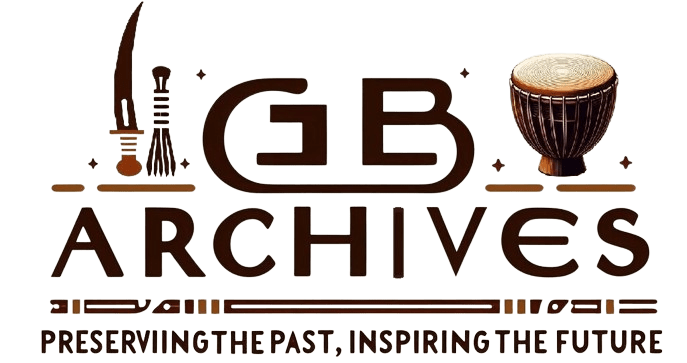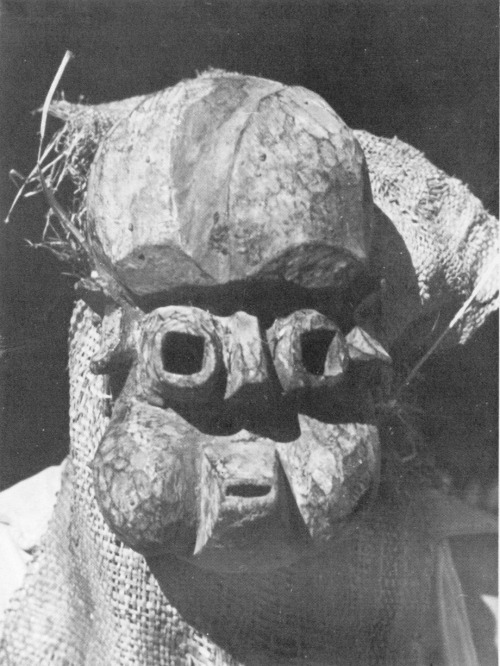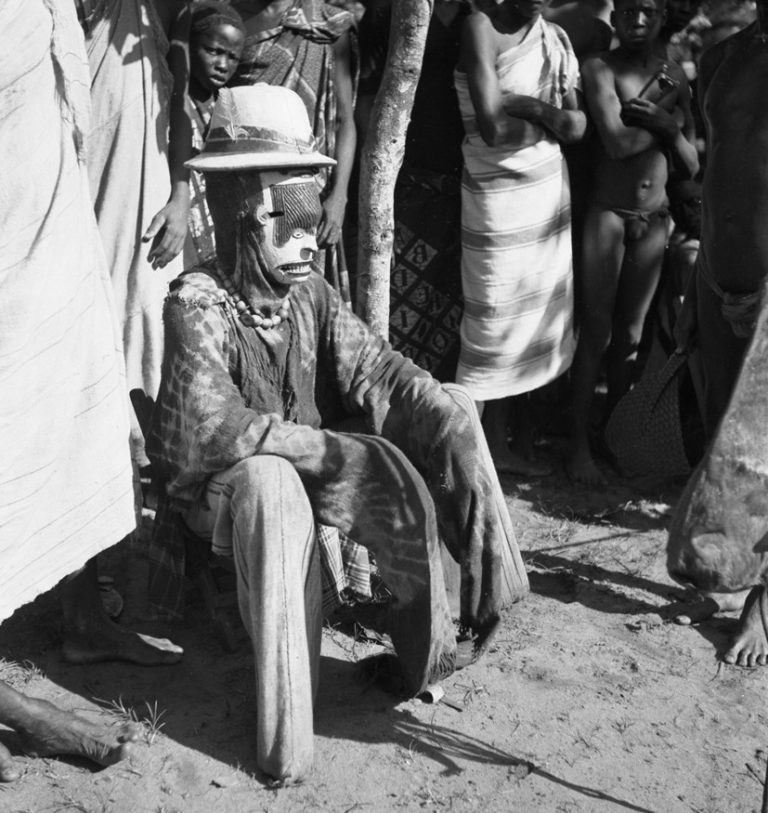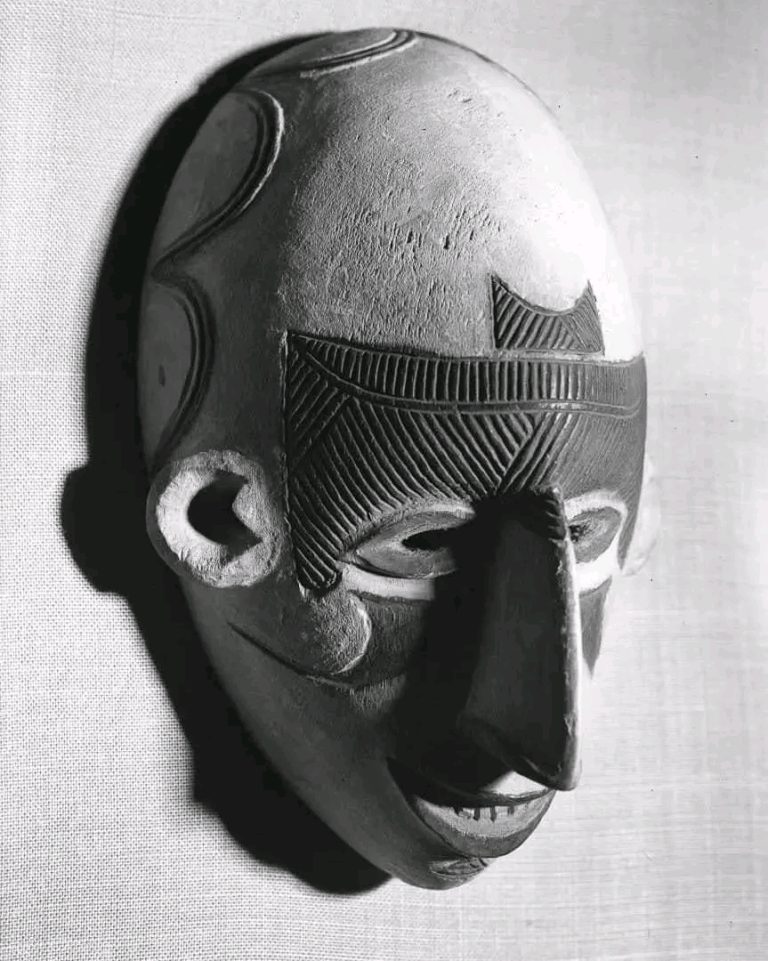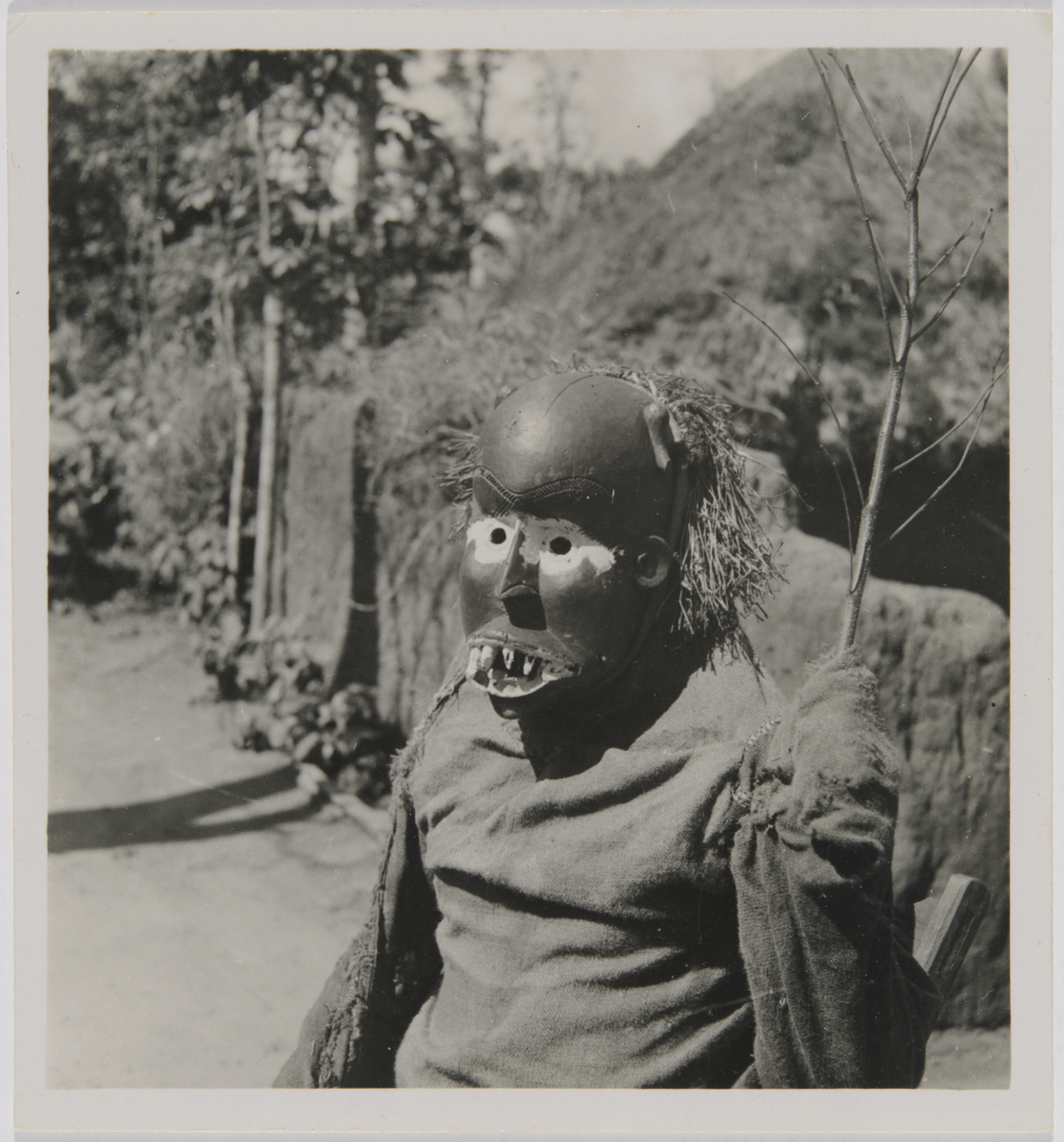
The photograph presents a hauntingly vivid image of the Iro Ekpetu masquerader, also known as the ‘Merciless’ Mau. The masquerader is seated, holding a stick in the left hand, with a striking black mask that exudes an aura of malevolence. The mask is intricately carved with decorative designs along the lower forehead, and the eyes are painted white, standing out in stark contrast against the dark mask. The exaggerated features of the mask, including a pointed nose and a bulging mouth with white-painted protruding teeth, evoke a sense of fear and reverence. The raffia hairpiece attached to the mask adds a wild, untamed element to the character. The masquerader’s cloth top complements the rugged appearance, making the entire ensemble a powerful representation of the supernatural within Igbo cultural practices. The background, with its traditional mud huts, thatched roofs, and dense vegetation, situates the masquerade within its authentic setting, emphasizing the deep connection between the Iro Ekpetu and the natural and spiritual world of the Igbo people..
The Significance of Iro Ekpetu in Igbo Culture
Masquerades hold a central place in the cultural and spiritual life of the Igbo people. They serve both as entertainment and as a medium through which ancestors and spirits manifest in the world of the living. Among the myriad of masquerades within Igbo culture, the Iro Ekpetu stands out for its fearsome reputation and deep symbolism.
Captured in a photograph between 1932 and 1938 by the renowned photographer Gwilliam Iwan Jones, the Iro Ekpetu, or “Merciless,” is depicted in a powerful and unsettling form. The photograph was taken in Amuda village, located in the Onitsha Province. This region is rich in Igbo traditions and known for its vibrant masquerade festivals.
The Role of “Mau” Masquerades
The “Mau,” or ghost masquerades, to which Iro Ekpetu belongs, are particularly significant. These masquerades are believed to embody the spirits of the dead, returning to the land of the living to impart wisdom, enforce social norms, or deliver justice. The Iro Ekpetu masquerade, with its menacing appearance, represents a spirit of retribution. This spirit is feared by those who have wronged others or disrupted communal harmony.
The Mask and Its Symbolism
The mask worn by the Iro Ekpetu masquerader is a masterpiece of traditional Igbo craftsmanship. Carved from wood, its black coloration symbolizes the unknown and the unknowable aspects of the spirit world. The incised decorative designs on the mask’s forehead enhance its aesthetic appeal while carrying symbolic meanings related to the masquerade’s spiritual function.
The mask’s eyes, painted white, are a focal point. In Igbo cosmology, white is often associated with purity and the spiritual realm. The stark contrast of the white eyes against the black mask creates an eerie, penetrating gaze. This gaze is intended to evoke fear and awe, reminding the community of the spiritual world’s ever-present influence.
The Masquerader’s Appearance
The mask’s protruding teeth, painted white, add to its fearsome appearance. These exaggerated features communicate the merciless nature of the spirit that Iro Ekpetu embodies. This spirit does not forgive easily, and its presence warns those who have violated society’s moral codes.
The raffia hairpiece attached to the mask further enhances the masquerader’s wild, otherworldly appearance. Raffia, derived from palm leaves, is commonly used in Igbo masquerades. Its natural, untamed quality symbolizes the connection between the spirit and the natural world, emphasizing the masquerade’s role as an intermediary between the two realms.
The cloth top worn by the masquerader is simple yet effective in completing the overall appearance. The understated choice of clothing allows the mask to dominate the visual impact of the masquerade. This reflects the Igbo understanding that the spirit’s power lies not in its physical form but in its ability to influence and command the living’s attention.
In today’s world, where many traditional practices are threatened by modernization and globalization, images like this remind us of the Igbo people’s rich cultural heritage. The Iro Ekpetu masquerade, with its fearsome appearance and deep symbolism, powerfully represents the complex interplay between the spiritual and physical worlds in Igbo culture.
Have you encountered the Iro Ekpetu or similar masquerades in your community? Share your experiences and thoughts in the comments below.
Explore Further:
For more on this topic, explore the post below. It provides a deeper insight.
 Artistic Insights
Artistic InsightsMasks hold a special place in the cultural and artistic heritage of the Igbo people. These elaborate creations are not merely decorative objects; they carry deep spiritual, social, and cultural meanings. From ancient times to the present day, Igbo masks have played crucial roles in ceremonies, rituals, and festivals, symbolizing various aspects of life and […]
Discover more from Igbo Archives
Subscribe to get the latest posts sent to your email.

